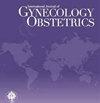Application of the mesh bridging technique in the excision of abdominal endometriosis lesions: Case report and literature review
IF 2.6
3区 医学
Q2 OBSTETRICS & GYNECOLOGY
引用次数: 0
Abstract
Abdominal wall scar endometriosis (AWE) is a rare endometriosis that usually occurs after gynecological or obstetric surgery and for which surgical resection is the standard treatment. For large tissue defects after resection, abdominal wall reconstruction is needed. Here, we describe a mesh bridging technique using biological and polypropylene meshes for abdominal wall reconstruction. A 34‐year‐old woman visited the center with complaints of low abdominal wall pain during menstruation for more than 5 years. Her surgical history included undergoing a cesarean section delivery twice. A mass measuring 6 cm × 5 cm × 3 cm was found above the symphysis pubis in the lower part of the abdominal incision. Endometriosis lesion was considered based on abdominal ultrasound and magnetic resonance imaging findings. After a multidisciplinary discussion that included surgical experts and gynecologists, the decision was made to perform abdominal endometrial focus excision plus abdominal wall reconstruction. Two kinds of mesh were skillfully used in the operation of this patient. Biological mesh was used close to the peritoneal side and covered with polypropylene mesh to reduce the stimulation by the polypropylene mesh of the peritoneum, enhance the strength of the biological mesh, and reduce the incidence of abdominal wall hernia. Our case demonstrates that accurate diagnosis of AWE followed by complete resection and reconstruction of the abdominal wall using a combination of biological and polypropylene mesh bridging can achieve good therapeutic results and patient satisfaction.在腹部子宫内膜异位症病灶切除术中应用网桥技术:病例报告和文献综述
腹壁瘢痕子宫内膜异位症(AWE)是一种罕见的子宫内膜异位症,通常发生在妇科或产科手术后,手术切除是其标准治疗方法。对于切除术后的大块组织缺损,需要进行腹壁重建。在此,我们介绍一种使用生物和聚丙烯网片进行腹壁重建的网片桥接技术。一位 34 岁的女性因月经期间腹壁下部疼痛 5 年多前来就诊。她的手术史包括两次剖腹产。在腹部切口下部耻骨联合上方发现一个 6 厘米 × 5 厘米 × 3 厘米的肿块。根据腹部超声和磁共振成像结果,考虑为子宫内膜异位症病变。经过包括外科专家和妇科医生在内的多学科讨论,决定进行腹腔子宫内膜病灶切除术加腹壁重建术。在该患者的手术中巧妙地使用了两种网片。在靠近腹膜一侧使用生物网片,并覆盖聚丙烯网片,以减少聚丙烯网片对腹膜的刺激,增强生物网片的强度,降低腹壁疝的发生率;在靠近腹膜一侧使用生物网片,并覆盖聚丙烯网片,以减少聚丙烯网片对腹膜的刺激,增强生物网片的强度,降低腹壁疝的发生率。我们的病例表明,准确诊断 AWE 后,采用生物网片和聚丙烯网片联合桥接的方式进行腹壁全切和重建,可以取得良好的治疗效果,并让患者满意。
本文章由计算机程序翻译,如有差异,请以英文原文为准。
求助全文
约1分钟内获得全文
求助全文
来源期刊
CiteScore
5.80
自引率
2.60%
发文量
493
审稿时长
3-6 weeks
期刊介绍:
The International Journal of Gynecology & Obstetrics publishes articles on all aspects of basic and clinical research in the fields of obstetrics and gynecology and related subjects, with emphasis on matters of worldwide interest.

 求助内容:
求助内容: 应助结果提醒方式:
应助结果提醒方式:


